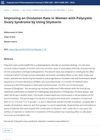Progress in Diagnosis and Treatment of Polycystic Ovary Syndrome with Traditional Chinese and Western Medicine
August 2022
in “
Journal of Contemporary medical practice
”

TLDR Combining Traditional Chinese Medicine and Western medicine can improve symptoms, hormone levels, and pregnancy outcomes in Polycystic Ovary Syndrome patients, but more research is needed.
Polycystic Ovary Syndrome (PCOS) affects 5.61% of childbearing age women in China, with 80% of these patients being thin and infertile. The disease is multifactorial, involving genetic factors, insulin resistance, inflammatory factors, and lifestyle factors. Traditional Chinese Medicine (TCM) and Western medicine both offer treatment options. Western medicine can improve hormone levels, ovulation rate, and pregnancy rate, but may have adverse reactions. TCM has shown positive effects with fewer adverse reactions, but most studies have small sample sizes. Combining TCM and Western medicine has shown promising results, improving clinical symptoms, endocrine levels, ovarian function recovery, follicular development, and optimizing pregnancy outcomes. However, more research and larger sample data are needed to support this integrated approach.




